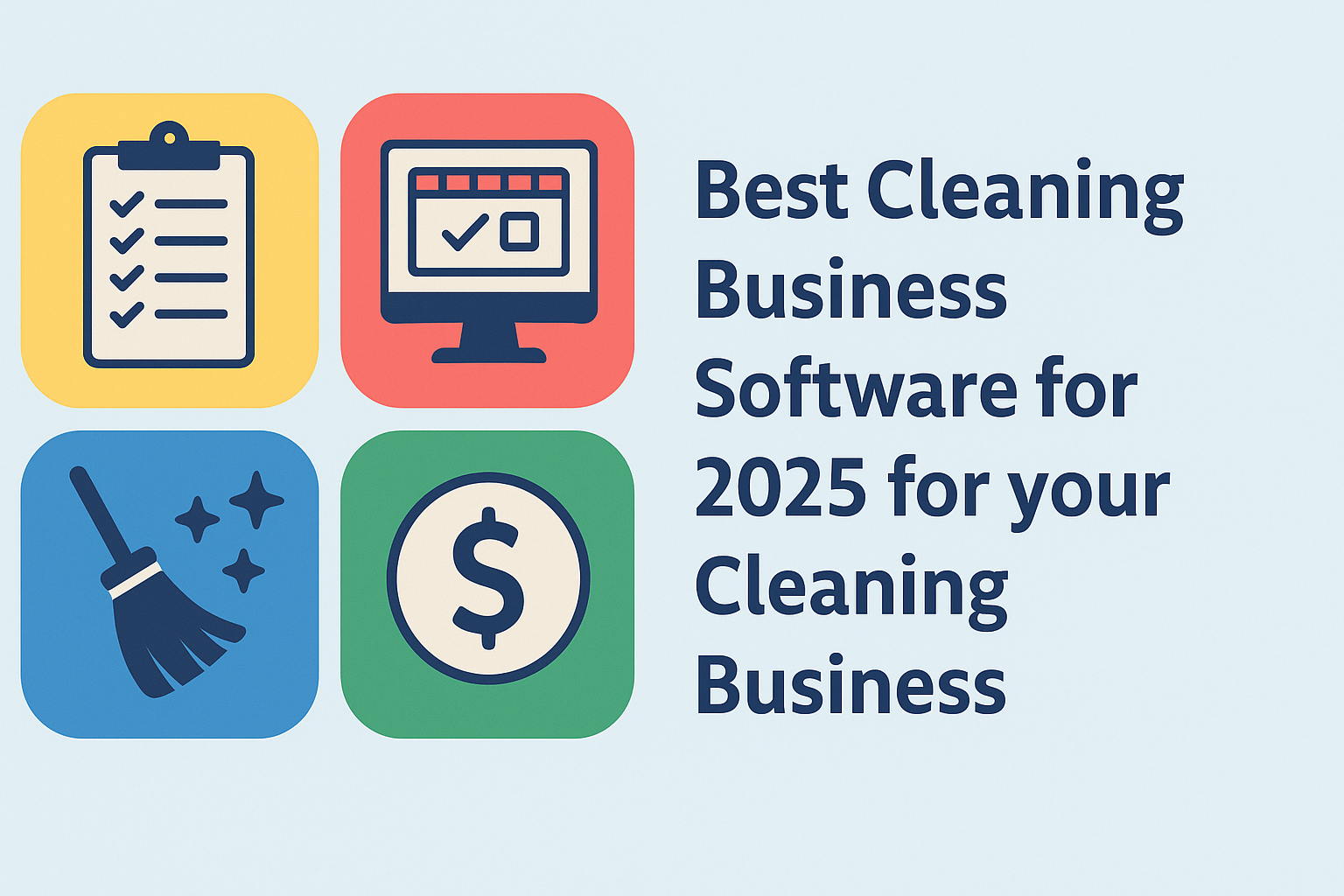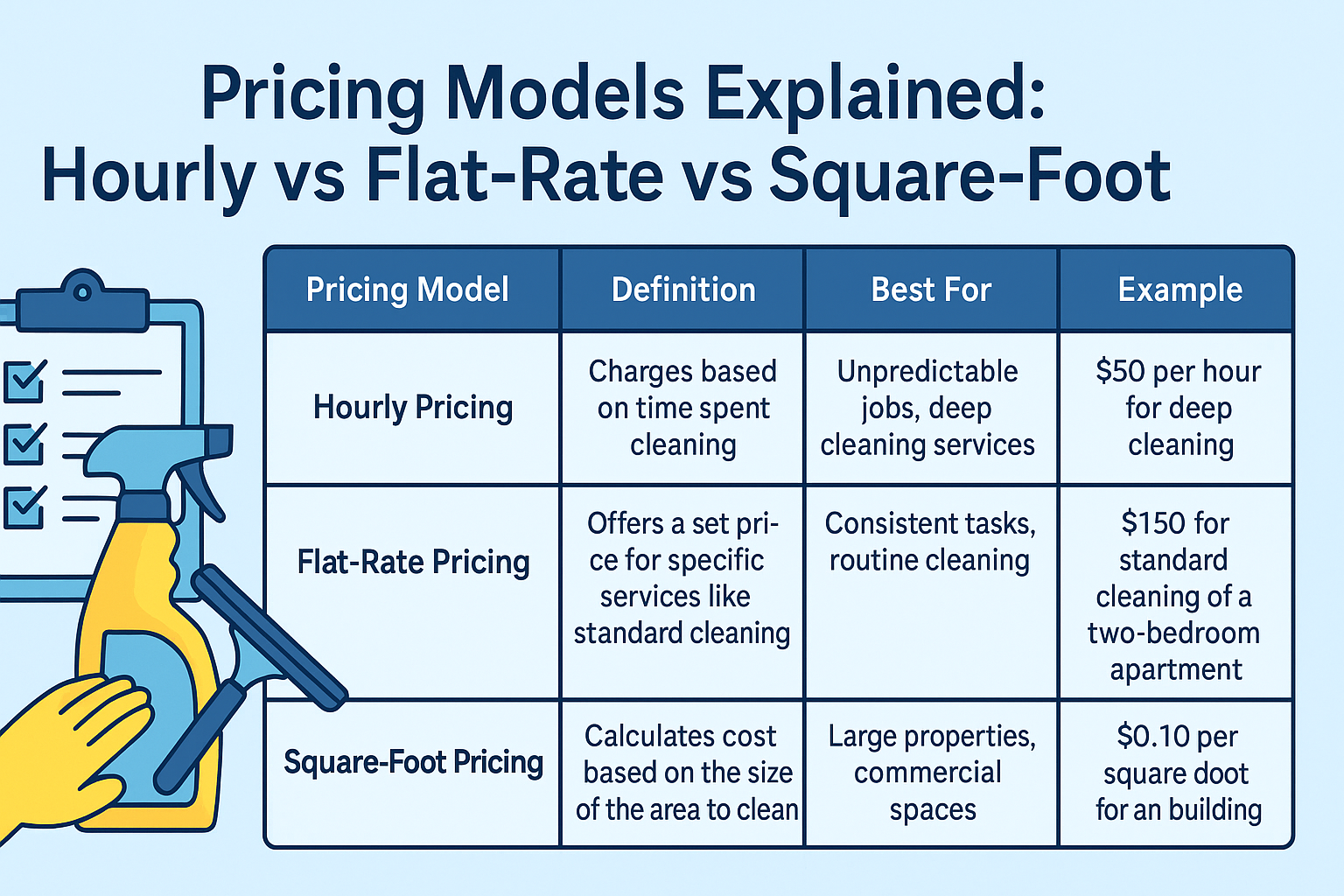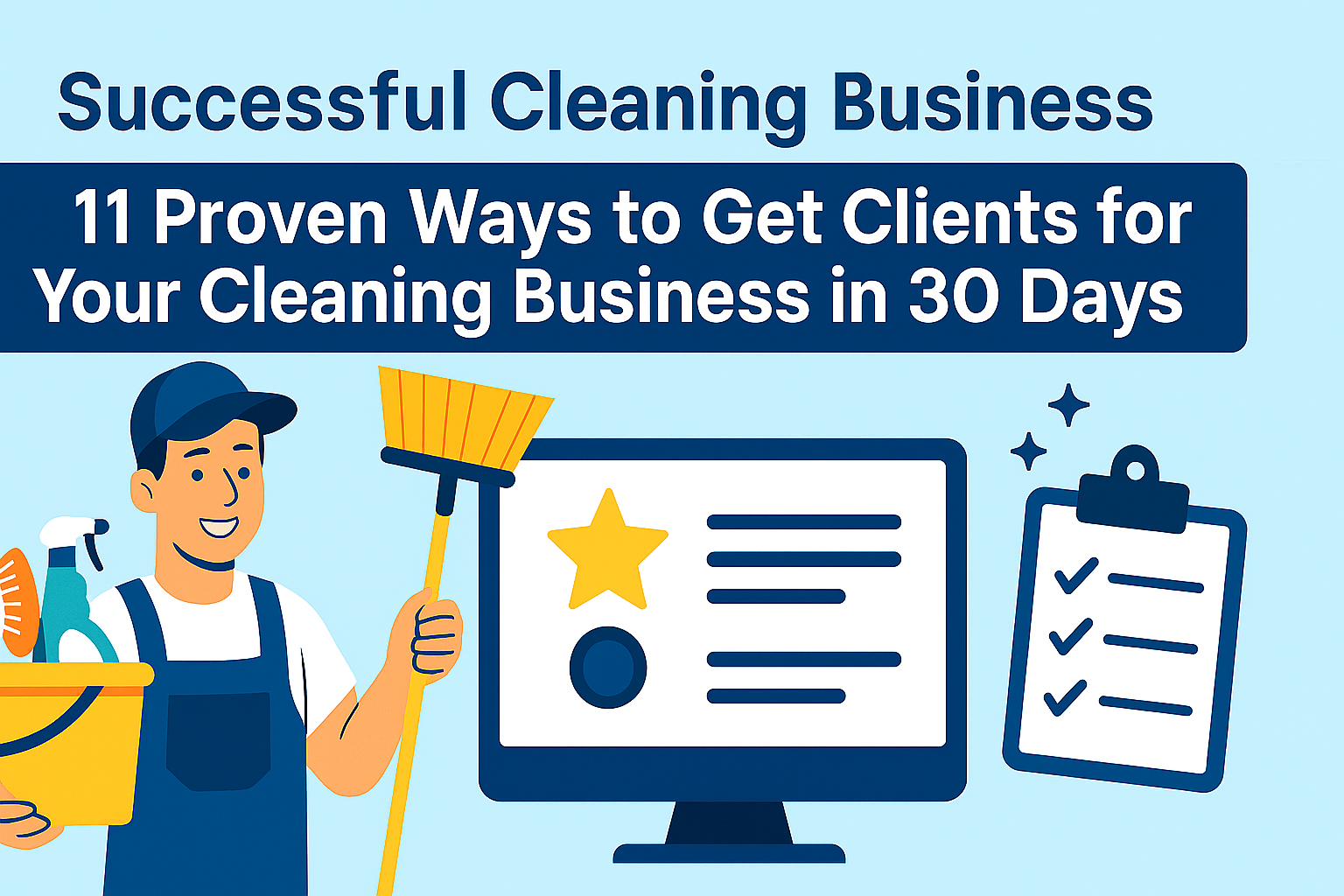5 Financing Options to Buy a Cleaning Business: Exploring Loans and Funding Solutions
Embarking on the journey of acquiring a cleaning business presents a landscape of opportunities and challenges. Navigating the financial aspects requires a strategic approach, understanding various funding avenues, and aligning them with your business goals. This article explores five key financing options to facilitate your entry into the cleaning industry.
For an in-depth analysis on how to buy a cleaning business be sure to read this guide.
Understanding the Cleaning Business Landscape
The Importance of a Clean Service
In today’s world, the importance of a clean service cannot be overstated, impacting health, safety, and overall well-being. From janitorial duties in offices to commercial cleaning in retail spaces, the demand for a clean environment is constant. Therefore, a business owner should be aware of the necessity to provide cleaning services.
Types of Cleaning Services Available
The cleaning industry encompasses a diverse range of services. These options for cleaning services span from residential cleaning to specialized tasks like carpet and upholstery cleaning, reflecting the variety of needs. Understanding the different types of cleaning businesses is important if you plan to buy a cleaning business.
Market Trends in the Cleaning Industry
The cleaning industry is dynamic, influenced by factors such as health concerns and environmental awareness. Market trends indicate a growing demand for green cleaning and specialized services. These trends shape the business plan. Understanding these nuances is crucial for sustained success in the cleaning industry.
Financing Options for Buying a Cleaning Business
Small Business Loans Overview
Small business loans are a popular financing option for aspiring business owners. These types of small business loans provide capital to cover various business expenses, from purchasing cleaning equipment to securing working capital. A traditional bank often requires a detailed business plan. Your credit score will also be taken into account.
Seller-Note Financing Explained
Seller-note financing offers an alternative route. Here, the seller of the business provides a loan to the buyer, often simplifying the financing process. This financing option can be particularly appealing for those seeking more flexible terms than traditional business loans for cleaning services. However, you should not rely on it blindly.
Rolled Equity as a Financing Option
Rolled equity involves the seller retaining a portion of ownership in the cleaning company. This type of financing solution aligns the interests of both the buyer and seller, fostering a collaborative approach. With rolled equity, the seller has incentive to help grow the new business. It can also bring knowledge into the company.
Evaluating Your Business Needs
Assessing Your Financial Situation
Before exploring various financing options available, it’s essential for the prospective business owner to assess their financial situation. Understanding your personal credit score, available assets, and existing debts is paramount. This assessment will influence the type of financing you can realistically secure, such as business loans or a line of credit, as well as the interest rates you might be offered. A clear picture of your financial standing will guide you toward the most suitable path to buying a cleaning business.
Understanding Your Business Goals
Defining your business goals is integral to selecting the right business funding. Are you aiming for rapid expansion, a niche in a particular market segment like commercial cleaning, or maintaining a sustainable, small operation? Your growth plans will dictate the level of working capital required and whether term loans or other financing solutions are more appropriate. Aligning your financial strategy with your business goals ensures that you obtain the necessary resources to achieve your vision for the cleaning company.
Identifying the Right Financing Option
Identifying the right financing option involves carefully weighing the pros and cons of each type of financing. Consider the amount needed, the repayment terms, and the interest rates associated with different business loans for cleaning services. Do your research to select from the different options for cleaning services. Evaluate whether a traditional bank loan, an SBA loan, equipment financing, or a seller-note is the best fit for your specific needs. This will help you identify which is the right business plan to buy a cleaning business.
Types of Loans for Cleaning Businesses
Traditional Business Loans
Traditional business loans, often secured through a traditional bank, remain a cornerstone of business funding. These term loans typically require a strong business plan, a solid credit score, and collateral. Traditional lenders scrutinize your financial history and project future cash flow to assess the risk. While they may offer competitive interest rates, the approval process can be lengthy.
SBA Loans for Cleaning Services
SBA loans for cleaning services are partially guaranteed by the Small Business Administration (SBA), making them an attractive type of financing option for cleaning businesses. These loans generally offer favorable terms, including lower down payments and longer repayment periods. The SBA works with participating lenders, such as banks and credit unions, to provide business loans for cleaning services to small business owners. SBA loans can be a viable option if you are unable to qualify for a traditional business loan.
Alternative Financing Solutions
Beyond traditional and SBA loans, alternative financing solutions offer flexibility for cleaning businesses. These options include business lines of credit, equipment financing, and online lenders. A business line of credit provides access to working capital for daily expenses, while equipment financing helps acquire necessary cleaning equipment. Online lenders often offer faster approval processes, but may come with higher interest rates. Considering these alternatives can be crucial for cleaning businesses with unique financing needs.
Strategies to Grow Your Cleaning Business
Leveraging Financing to Scale
To truly scale a cleaning business, strategic use of financing is essential. A business owner should consider various financing options available to fuel growth. Securing a business loan from a traditional bank, exploring SBA loan opportunities through the Small Business Administration, or even utilizing equity financing solutions can provide the working capital needed. Investing in more cleaning equipment, expanding your service business area, or hiring additional staff requires careful financial planning and the right business financing.
Investing in Marketing and Expansion
Investing in marketing is vital for any cleaning business. Effective marketing strategies can attract a wider range of customers, increasing cash flow and business revenue. This might include online advertising, targeted social media campaigns, or local outreach programs to connect with potential clients. Strategic expansion, such as offering specialized options for cleaning services like commercial cleaning, can tap into new markets and create new business opportunities, which would require business funding or loans for cleaning. This requires a well-developed business plan.
Partnering with Other Cleaning Service Companies
Partnering with other cleaning service companies can be a strategic move to expand your cleaning business’s reach and service offerings. Collaborations can allow access to a wider client base, specialized expertise, and shared resources. For example, a residential cleaning service could partner with a commercial cleaning firm to offer comprehensive solutions to both markets. This can open up new avenues for growth without the need for significant upfront financing. Careful consideration of potential partners is essential to ensure a mutually beneficial relationship.
Summary
Navigating the financial path to buy a cleaning business requires careful planning and consideration of various financing options available. From traditional business loans and SBA loans offered through the Small Business Administration to innovative approaches like seller-note financing and rolled equity, understanding the nuances of each option is paramount. By assessing your business needs, understanding your credit score, evaluating interest rates, and exploring alternative financing solutions, you can make informed decisions to secure the necessary working capital for your venture into the cleaning industry.
FAQ
Q: What are the 5 main financing options for buying a cleaning business?
A: The 5 primary financing options for buying a cleaning business include: 1) SBA loans through the Small Business Administration, which offer favorable interest rates and longer repayment terms; 2) Seller financing or seller-note, where the previous business owner acts as the lender; 3) Rolled equity, where you maintain the seller as a partial owner; 4) Traditional business loans from banks or credit unions; and 5) Alternative financing solutions such as equipment financing, lines of credit, or online lenders. Each of these options available has unique advantages depending on your business goals, credit score, and the specific cleaning company you’re looking to buy.
Q: How does an SBA loan work for purchasing a cleaning service business?
A: An SBA loan for purchasing a cleaning service business is backed by the Small Business Administration, reducing risk for lenders. These loans typically offer favorable terms including lower down payments (often 10-15%), longer repayment periods (up to 25 years for real estate, 10 years for business acquisitions), and competitive interest rates. To qualify, you’ll need a good credit score (typically 650+), a detailed business plan for the cleaning company, and sometimes industry experience. The SBA 7(a) loan program is the most common, offering up to $5 million in financing. The application process is thorough and requires documentation of your personal finances, business projections, and details about the cleaning business you intend to buy.
Q: What is seller financing or a seller-note when buying a cleaning business?
A: Seller financing, also known as a seller-note, is when the current owner of the cleaning business acts as the lender for part of the purchase price. In this arrangement, you make a down payment (typically 20-30%) and pay the remaining balance to the seller over time with interest. This financing option is particularly valuable when traditional financing options are limited. The terms are negotiable, including interest rates, payment schedules, and duration. Seller financing demonstrates the seller’s confidence in the business’s potential and your ability to successfully operate it. It’s often combined with other financing methods to create a complete funding package when buying a commercial cleaning or janitorial business.
Q: What is rolled equity and how can it help finance buying a cleaning company?
A: Rolled equity is a financing option where the current owner retains partial ownership in the cleaning business after selling it to you. Instead of completely exiting, they “roll” some of their equity into the new ownership structure. This arrangement reduces the amount of cash you need upfront to purchase the business. It can be particularly advantageous as the seller remains invested in the company’s success and may continue providing valuable industry expertise and client relationships. For example, you might purchase 70% of a commercial cleaning service while the seller maintains 30% ownership. This option often works well when buying established cleaning businesses with strong cash flow and growth potential.
Q: What types of loans are available specifically for cleaning businesses?
A: Several types of loans are tailored for cleaning businesses. SBA loans, particularly the 7(a) and 504 programs, offer favorable terms for purchasing existing cleaning service companies. Term loans from traditional banks provide lump sums with fixed repayment schedules. Business lines of credit provide flexible working capital for operational expenses and seasonal fluctuations. Equipment financing allows you to purchase cleaning equipment while using it as collateral. Microloans (typically under $50,000) are available for smaller cleaning operations or startups. Online lenders offer alternative financing with faster approval but higher interest rates. Each type of financing has specific requirements regarding credit scores, collateral, time in business, and annual revenue, so it’s important to research which best aligns with your business needs and goals.
Q: How important is a business plan when seeking financing to buy a cleaning business?
A: A comprehensive business plan is crucial when seeking financing to buy a cleaning business. Lenders and investors use it to evaluate your understanding of the cleaning industry and your ability to generate profit. Your plan should include detailed financial projections showing how you’ll manage cash flow and repay the loan. It should outline your target market (residential, commercial cleaning, or specialized services), competitive analysis, marketing strategy, and operational plans. Include information about key staff members, particularly those with cleaning industry experience. Additionally, articulate your growth strategy and business goals for the cleaning service. A well-crafted business plan demonstrates your commitment and increases your credibility with potential lenders, significantly improving your chances of securing favorable financing options for your cleaning service.
Q: What credit score is needed to finance buying a janitorial or cleaning business?
A: Credit score requirements vary by financing option when buying a janitorial or cleaning business. For SBA loans, which offer some of the best terms, you’ll typically need a personal credit score of at least 650, though 680+ is preferred. Traditional bank loans usually require higher scores of 700+. Seller financing may be more flexible, with some sellers accepting scores of 600+ if other factors are strong. Online lenders and alternative financing sources might approve loans with scores as low as 550, but will charge significantly higher interest rates. Beyond your credit score, lenders will evaluate your industry experience, business plan, collateral, and the cleaning business’s historical performance and cash flow. If your score is lower, consider improving it before applying or explore financing options with less stringent credit requirements.
Q: How can I determine which financing option is best for my specific cleaning service business?
A: To determine the best financing option for your cleaning service business, start by assessing your specific business needs and goals. Consider factors like the purchase price, your available down payment, credit score, industry experience, and timeline. SBA loans are excellent if you qualify and can wait through the longer approval process. Seller financing works well if the current owner is willing and you need flexible terms. Traditional bank loans may offer competitive rates if you have strong credit and collateral. Equipment financing makes sense if a significant portion of the purchase involves cleaning equipment. Rolled equity partnerships are valuable when you want the seller’s continued involvement and expertise. The ideal approach often combines multiple financing options. Consult with a business broker or financial advisor experienced in the cleaning industry to create a customized financing strategy aligned with your specific situation.
Q: What are typical interest rates and terms for loans when buying a commercial cleaning service?
A: Interest rates and terms for buying a commercial cleaning service vary by financing type. SBA loans typically offer the most favorable terms with interest rates ranging from 6-9% and repayment periods of 10-25 years, depending on loan purpose. Conventional bank loans generally have rates between 5-10% with 5-10 year terms, requiring stronger credit and collateral. Seller financing rates typically range from 6-10% with terms of 3-7 years, but are negotiable. Equipment financing rates run 8-15% with terms matching the equipment’s useful life (usually 3-7 years). Online lenders offer faster funding but at higher rates, typically 10-25% with shorter 1-5 year terms. Down payment requirements vary from 10% for some SBA loans to 30% for conventional financing. These terms fluctuate based on economic conditions, your credit score, business history, and the cleaning company’s financial performance.
Q: What common challenges do buyers face when financing a cleaning business purchase?
A: Buyers face several common challenges when financing a cleaning business purchase. Many struggle with insufficient down payment funds, as most loans require 10-30% down. Demonstrating the cleaning business’s value can be difficult if it has incomplete financial records or cash transactions not reflected in official statements. Service businesses like cleaning companies have limited hard assets for collateral, making some lenders hesitant. Buyers often face strict qualification requirements including good credit scores, industry experience, and collateral. The cleaning industry’s low barriers to entry can make lenders cautious about competitive threats. Seasonal or inconsistent cash flow patterns may raise concerns about loan repayment ability. Navigating these challenges requires preparation, possibly working with a business broker familiar with cleaning businesses, exploring multiple financing options, and being prepared to combine different funding sources to complete the purchase.






